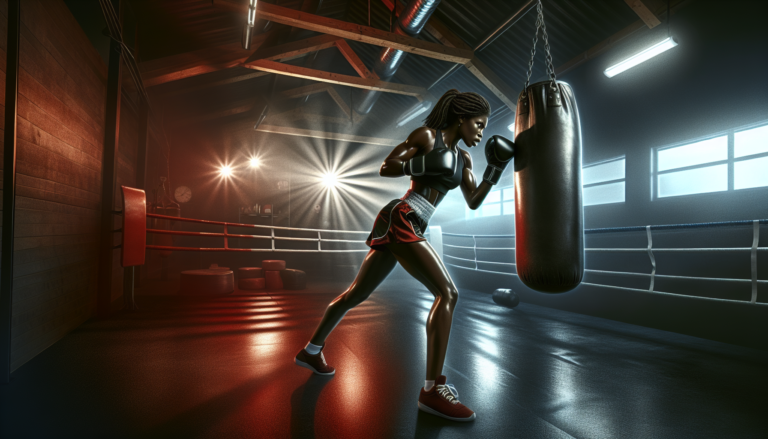To enhance reaction time in boxing, sharpen your reflexes and mental agility. Imagine you’re in the ring, the crowd’s roar is a distant thunder, and your opponent’s fists are lightning strikes. You need to be the storm chaser, predicting and evading with precision.
That split-second faster you react can mean the difference between landing the punch or kissing the canvas. It’s the thin line between triumph and the bitter taste of defeat.
I’ll guide you through techniques that transform you from a sitting duck to a dodging dynamo. With insights gleaned from the sweat and echoes of countless gyms, we’ll tackle this together.
Prepare to duck, weave, and strike with the finesse of a seasoned pro. Let’s get ready to make milliseconds count.

Sharpen Your Reflexes: Techniques to Enhance Reaction Time in Boxing

The Speed of Thought: Understanding Reaction Time in the Ring
In boxing, milliseconds can separate victory from defeat. Your brain’s ability to process incoming punches and respond swiftly is important. It’s a dance of neurons, where speed is king. Imagine your brain as a high-speed camera, capturing every jab and hook. The faster it processes, the quicker you dodge or counter.
Drill into Focus: Sharpening Your Mental Edge
To increase your reaction time, you must train your focus. Picture yourself in the ring, every sense tuned to your opponent’s moves. You can practice this outside the ring with focus drills. Try the ‘coin catch’ exercise. Drop a coin and catch it before it hits the ground. It’s simple yet effective. It hones your attention, preparing you for the split-second decisions in a bout.
Peripheral Vision: Seeing the Unseen
Peripheral vision is your secret ally. It lets you spot movements without turning your head. Work on this with ‘flash training.’ Have a partner flash numbers from your side view. Call them out without looking directly. This trains your eyes to catch the subtlest of movements, giving you an edge in anticipating strikes.
Anticipate to Dominate: The Art of Prediction
Anticipation is foresight in action. It’s about reading your opponent, predicting their next move. Shadowboxing can help. Visualize an opponent, anticipate their punches, and react. It’s a mental and physical rehearsal. You’re not just throwing punches; you’re responding to an invisible adversary, sharpening your predictive skills.
Reaction Drills: Quick Hands, Quick Mind
Finally, reaction drills are the cornerstone of your training. They’re about translating thought into action at lightning speed. Use the ‘light reaction system’ or apps that prompt you to touch or strike as soon as a light or signal appears. It’s a direct translation of ring conditions, where your reaction time can mean the difference between landing a punch or taking one.
Lifestyle Habits for Faster Reactions: The Power of Sleep, Nutrition, and Mind Training

Unlocking Speed: The Role of Restorative Sleep
You’ve heard it before: sleep is indispensable. But in boxing, it’s your secret weapon for faster reactions. Studies show that a well-rested brain responds quicker. Aim for 7-9 hours of quality sleep. It’s not just about the hours, though. It’s the quality. Deep sleep stages are where the magic happens. Your neurons repair and your brain processes the day’s training. Think of it as overnight maintenance for your reflexes.
Fueling Agility: Brain-Boosting Nutrition
What you eat matters. For boxers, brain foods can mean the difference between a sluggish jab and a lightning-fast cross. Omega-3s, found in fish, are like lubricant for your brain’s gears. Antioxidants in berries fight inflammation, keeping your neural pathways clear. Complex carbs from whole grains provide the steady energy your brain needs to stay alert. Hydration is key, too. Even mild dehydration can slow your reaction time. So, keep that water bottle handy.
Sharpening Instincts: Mind Training Techniques
Meditation and mindfulness aren’t just for monks. They’re tools for fighters. These practices train your brain to focus and react without hesitation. Picture this: you’re in the ring, and your opponent feints. A meditative mind spots the fake instantly, no second-guessing. Start with just 10 minutes a day. Focus on your breath, or visualize your movements in the ring. Over time, this mental discipline translates to quicker physical responses.
Consistency is Key: Building a Routine
It’s not enough to sleep well once or eat right for a day. Consistency is what builds champions. Make these habits part of your daily routine. Set a sleep schedule and stick to it. Plan your meals with brain health in mind. Dedicate time each day to mind training. It’s like muscle memory for your brain. The more you practice, the faster you’ll be.
The Synergy of Habits: Combining Forces for Maximum Impact
Each of these habits is powerful alone. But together, they’re a knockout combo. Sleep, nutrition, and mind training synergize to keep your reactions sharp. It’s a holistic approach. You can’t out-train a bad diet or sleepless nights. Nor can you meditate away the effects of poor nutrition. Balance is of the essence. Keep each element in check, and you’ll notice the difference in the ring.






